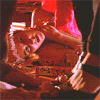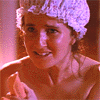| Occasional
Course Language: An Interview with Brad Hayward
"Aussie Filmmaker shoots from
the hip with his debut Film"
    
Brad Hayward Writer/Director
& Co-Producer of Occasional Course Language speaks his mind about the
film and the journey it took to get it to the big-screen. Lucky for me
(and you), I was on hand to record the details.
The Film concerned is Occasional
Course Language an Australian comedy that delights and propels laughter,
both thick and thin. It is Brad's first foray into the cinema circuit.
Brad's record to date (before OCL) is a short film he wrote, produced and
directed in 1996, a self funded French language farcical homage to Bunuel,
titled "L'Araignee" (The Spider). It was accepted into the St Kilda short
Film Festival.
Occasional Course
Language focuses on Min Rogers (Sara Browne), and the events that occur
in one week that will change the direction of her life and those around
her. It's up front style is synonymous with the title itself. One could
regard it as a 'chick flick with attitude'.
Excerpt from a Film Review by Sam Gaoa
Brad Hayward wrote the 157 page
script over a long weekend. Determined by a 'failure' rate being the possible
outcome for any novice filmmaker, he took a leap of faith which has been
justly rewarded. Any aspiring filmmaker wannebe's out there should take
note! This is an example of passion, commitment and "sheer bloody mindlessness"
in making a feature length movie.
SG:
I found the press information about the production a very interesting
read. Also, that you were able to churn this out (the script) over a long
weekend?
BH:
Yeah, 157 pages. As you know when your writing you sometimes get
into that subconscious realm, and time has no meaning, it actually
poured out. I was actually writing another script at the time (Just
finished it). At that stage looking at trying to make it for @ $20, 000
-
when I looked at it all up, it was basically impossible to do for that
sort
of money. So moving on from that I felt that well, if I try and write
something fast and fun and sort of dialogue driven, and we shoot it in
the same manner, then maybe its energy will be the thing that…you
know, will see it through…its energy will be the thing that audiences
will relate to, and we might get it (the film) across the finish line.
SG:
You make reference to an article which helped inspire you to make it
happen. What was the article and by whom?
BH:
I looked at becoming a director and thought it's an unachievable goal
for someone who hadn't been to film school, and had no experience at
that sort of thing (before he made his short film). But there is a great
journalist/commentator called Phillip {Adams?} in Australia. I was a
regular reader of his weekly column for a long time. Anyway, he wrote
something one week that summed up everything I was striving to do and
be in life…it was about spirit and about having a shot, which is quite
an
Aussie thing, and I guess a Kiwi thing too. So I felt really inspired by
it
and just thought well, why not? You know, why not make a film? Having
models like The Brothers McMullen and some of those other low budget
Australian flicks -my ambition was to be the first no-budget film to make
it to the big screen. Unfortunately Love and Other Catastrophes beat
me to the punch…which isn't a bad thing, that's the game.
SG:
During the preview screening I couldn't help thinking about Love and
Other Catastrophes…some things being similar? Still, OCL is quite
original in its premise. Did you take any inspiration (ideas) from film's
like this?
BH:
No not really. What was good about Love Cat's is that it proves that
you are able to get a film done with little or no backing (funding), and
manage to interest a distributor to get it to the big screen. So, as far
as
Love Cat's itself no, but more the process of how they stuck it together.
It was quite a concurrent thing. I just waited 9 months to be rejected
from the funding bodies. Otherwise we probably would've come out
around the same time…or maybe a little bit after? -he still would have
beaten me to the punch though. The same goes for The Castle. I think
they did that one for @ $7-8 million, which isn't huge in terms of
budgets. In Australia, at least, anything under $5 million is classed low-
budget. So for that sort of money -and again it was done outside the
funding bodies. It was shot quickly, doesn't look great but it did really
well with audiences, who loved the story. My point being, this sort of
compelled me with a bit more confidence "Let's you know take a shot
at it"
SG:
How much did OCL cost all up?
BH:
Well, we actually did a version [Beta-cam] for $40,000, with music and
the box effects, as well as having the 35mm version (film). Once
Village came on board, they gave us completion finance, and it cost
$950,000, plus paying the cast and crew. There's also 33 songs
(tracks) in the film, a huge music component, and all the post-
production to blow it up to 35mm, the Letterman sequences etc. Quite
a massive post-production bill all up. But still, relatively, that aint
a
great deal in the movie business.
SG:
I know you made a short film previously was it funded by
SBS? Or have I got my details mixed up?
BH:
No I funded it. It was bought by SBS. It's actually French, and
I don't speak French. I was going through this huge New
Wave/French phase. I came up with this little scenario, and I
thought I can't do this in English, it's got to be in French. So
we subtitled it and did the whole thing and SBS loved it, so
they bought it.
SG:
The film (O.C.L) is a sort of a chick-flick focusing on Min's journey
isn't it?
BH:
Basically it's Min (Sara Browne) whinging for 90 minutes. I mean
that's what the movie is. So the worry was, how do you get the audience
to empathise with someone who is basically whinging the whole time? I
take it as a personal triumph that we got audiences to latch on to it.
She
(Sara Browne) doesn't have the most pleasant…voice, it's quite
[gnarring?] brittle. We also copped a fair whack of criticism about the
language…(Irony perhaps?). People found it very affronting that
women were talking like this. Especially male reviewers. Whereas
female audiences (Australian) loved it!
Brad's
comments about female viewers appreciating the content was noted in the
test screenings before it's release in Australia. Another interesting bit
of information was the range of age groups that enjoyed the film.
BH:
You know where its really had a good time? With the older women's
age group, i.e like 40-50, even 60. I've been in theatres (where the
film's screening), and there have been 60 and 70 year olds laughing
their heads off. Maybe they see their daughters?….
One
can only praise (and admire) the determined spirit of this young at heart
film-maker. Brad's determination, passion and commitment are testament
to his beliefs and convictions, "grab the bull by the horns" or better
still think of the Nike phrase, "Just Do It" and that is exactly what Mr
Hayward has done. However, once the script was finished he faced an insurmountable
task of trying to get the project funded, through to enlisting a cast and
crew for the production. The film was not selected for funding which meant
that the project was going to have to rely on other sources.
BH:
Yeah well what happened: I actually, despite what the notes say,
produced the film as well. But since we didn't get the funding I thought
OK. So I raised $20,000 through selling my car and a number of other
things. I also put $5,000 on credit cards….end result, I was actually
busted.
So I thought I need help and thought of Trish Piper (Other Producer),
who helped to raise the rest of the cash for the production. So what
tried to always do was to look at having no (or limited) money as an
advantage. And funny enough it was quite freeing in that you are not
bound by a studio, or someone over your shoulder sort of saying, 'How
about you cast this person?'
So we tried to look at problems as opportunities to spin the whole thing
around. Once we started to get the whole thing rolling it got to the point
where we couldn't turn back (jump ship) even if we wanted to. You
know, the goodwill from so many people all sort of fed into this train
that just kept going. It was kind of a miracle that we actually got it
to
the big screen I think. And lots of luck. It was a seventeen day shoot,
we had no wet weather cover (insurance), and there was not a cloud in
the sky the whole time. Lots of things like that made it really happen!
SG:
Luck of the Irish perhaps?….and today's St Patrick's day….fitting
don't you think! [Brad laughs]. I was amazed at the way things did go
your way, you know with the difficulty making a film is, particularly a
feature film.
BH:
It was sheer bloody-mindlessness. A bit of the inspiration too was that
I'd seen a-lot of films (not necessarily Australian)…You know films can
have stars and a big budget, but it won't necessarily make a great or
successful film. The only thing you really need is hopefully a good
script and some good performances to engage an audience. And none
of those things really cost much money [unless in Hollywood]. So, we
had to spin around the other way and somehow try to engage an
audience into this idea, story about Min. So that was the name of the
game to get people to try and empathise with Min and have a bit of fun
doing it in a modest way.
SG:
Getting back to Min - Sara Browne is it?
BH:
Yes
SG:
You did a big casting thing, and found her through that.
BH:
Yes. We put an add in the Sydney Morning Herald and over a couple
weekends (we hired a little room in the middle of the city) we saw 600
people. It was amazing. The audition piece was the opening monologue.
As soon as Sara walked in and did it…I didn't bother looking for
anyone else. So we got her on the first day. I wanted someone who
wasn't glamorous, with a bit of weight, and who could look like your
normal, average looking sort of person. But who could deliver this sort
of dialogue in a realistic way, but with a sense of irony and self-
deprecating manner, which is quite a tricky balance to achieve.
Especially when most of the film is…everything you see is 1-2 takes
max. It's like -that's all. Our shooting ratio was like 2-1/2 to 1. So,
there's no room for error. It's like; you've got one chance, honey,
you'd better make the most of it.
SG:
Are the rest of the cast relatively new? I mean do they have any
previous experience in film or theatre?
BH:
Well most of the actors had never been in front of a camera. Their
experienced ranged from either nothing to amateur theatre. Nick
Bishop who plays David was the most experienced and he'd just
graduated from drama school. So experience wise we were all at the
same level on both sides of the camera -literally [Sam laughs]. So the
learning curve…by the time it came to half way through production,
everyone had relaxed completely, having such a great time. However,
it was a shame that we couldn't go back to redo some of the earlier
stuff…some of the initial performances were a bit…stiff. God, you can
only do so much with one take…It's like any film. You've got to mould
a pile of clay and turn it into something. It was quite a challenge.
SG:
The post-production (editing) phase must have been a horrendous
amount of work, you have stills, montages, the box effects with the
internet segments…am I right?
BH:
In the edit we had a lot of problems to solve - performance, story - all
sorts of stuff. The stills came out of that, the Letterman stuff came out
of
that, the box [effects] information, that wasn't even in the script initially.
That came out of just how the hell do we get this thing to work? We actually
started cutting it in a Woody Allen style with a jazzy (sic) tinkering
piano,
and it was really dull and boring. We also had initial problem cutting
music,
because at that stage we didn't have the money to use tracks by Madonna
or
Kylie. Then one day the money did appear, so we had to rebuild the film
with
music we could afford. One day the editor was on hi way out and said "have
a
listen to this" [referring to music] CD which was quite in-your-face, and
over the
top. I cut the opening after Min's speech. The Ed came back the next day
and
said "What have you got?" I showed him, and he said "Look it's crazy, but
why
don't we keeping going this way? That's where the style of the film comes
from.
And then we thought, when someone says something, why don't we cut to a
dictionary definition [box effects]. And then we did all sorts of crazy
things…
its like it took a mind of its own.
Occasional
Course Language features a dynamic soundtrack (33 songs), boasting a variety
of contemporary local artists. The music (soundtrack) features as an intrinsic
element in the film. Brad Hayward also had firsthand experience working
in the industry as a singer/songwriter, struggling to make a living, with
limited success. Aside from this Brad points to the fact that the process
of writing and composing songs helped him to write scripts.
Realising
that no rewards were forthcoming as a singer/songwriter he decided to get
a regular job within the industry as a promoter. This position proved to
be stifling and restrictive to his creative and imaginative side, thus
moving him to consider other creative options….film-making was the choice.
SG:
I think the music is an integral part of the film. It's very fresh, vibrant
and marries the two (film & music) successfully. You have 33 tracks
in
the film, that's a lot of songs! Was it difficult to have this many? And
why so many?
BH:
The most difficult process was, because it's cut so dependent on the
music. It was really a tricky process (editing), especially the opening
sequence which is cut to the beat (of the track). By the time the editor
had gone I couldn't afford to pay for anymore. I had to do it myself, it
was really a hard slog. Some people said it's just non-stop music, and
I
guess it is (in a way). I think it works; it sort of adds to moments and
heightens the comedy in others, but it definitely is a non-stop music-
fest.
Brad
is currently committed to promoting the film with Roadshow Film Distributors,
who are handling its International release. New Zealand is the second country
to receive the film, and they are awaiting possible Indie sales in the
American film market as well as UK distribution.
Occasional
Course Language is screening at the Rialto (Newmarket) and selected theatres
in Auckland.
BH:
It's just amazing to write something and then a year later see your
work on the big screen, and seeing people having a great time - it really
is an amazing experience. It was beyond my wildest dreams, its been a
fairy-tale for me!
SG:
I do take my hat off to you (re: the film), and look forward to seeing
more of your work in the near future. Thank-you for the interview.
BG:
Thank-you Sam, and it was nice chatting with you too.
N.B:
Sam Gaoa interviewed Brad Hayward at the Quay West Hotel on the 17th
March 1999. His reviews for the film and the film soundtrack will feature
in Craccum Magazine (University of Auckland), Lava Magazine and "Out
and About"
Interviewer:
Sam Gaoa
Director:
Brad Hayward
Film:
"Occasional Course Language"
Released
through: Roadshow Film Distributors
Transcribed
By: Dean Man
©
1999
 |